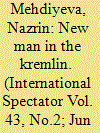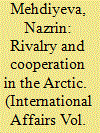| Srl | Item |
| 1 |
ID:
054366


|
|
|
| 2 |
ID:
082269


|
|
|
|
|
| Publication |
2008.
|
| Summary/Abstract |
President Dmitry Medvedev is neither a "liberal" nor a "puppet" of his mentor, Vladimir Putin. He is a capable politician, who appears genuinely to believe in the rule of law. Yet his formative policy experience has been overwhelmingly dirigiste, the approach that is unlikely to change fundamentally under his presidency. Medvedev's personal preferences in foreign policy are largely in line with the policies initiated by Putin, although his rhetoric and style will likely be more conciliatory. He will inherit a plethora of problems created by Russia's assertive policy, both in its near and far abroad. Moreover, the institutional constraints and informal rules within which Medvedev will have to operate make policy continuity more likely than policy reversal
|
|
|
|
|
|
|
|
|
|
|
|
|
|
|
|
| 3 |
ID:
153852


|
|
|
|
|
| Summary/Abstract |
The field of Arctic studies is becoming increasingly rich in empirical material across a broad array of topics and relationships, encompassing multiple international actors, both littoral and extra-regional. This article reviews three recent books on the Arctic, focusing on the evaluation of the potential for conflict in the region. Climate change will have long-ranging repercussions in the Arctic, where complex situations and choices will loom large, creating scope for international tensions. The scholarship demonstrates that there is much ‘old’ in the ‘new’ narratives of the North but at the same time posits that the region has been significantly less confrontational in the post-Cold War era than many observers predicted. Yet the Arctic is not hermetically sealed from other regions: international developments as well as the foreign policy ambitions of individual states, sometimes as remote as China, have been affecting emerging governance arrangements. In combination, the ‘spill-over effect’ of international crises and efforts by individual states to engage in sovereignty-enhancing exercises risk reducing cooperation among the states which have until now managed to maintain stability in the region.
|
|
|
|
|
|
|
|
|
|
|
|
|
|
|
|